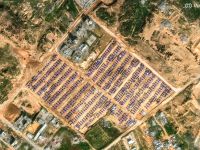Musical group Mashrou' Leila banned from Jordan
According to a widely shared Facebook post on the popular Lebanese alt-rock group’s official site:
"We have just been notified that our authorization to play has been withdrawn. The written justification officially provided is that the performance would have been at odds with what the Ministry of Tourism viewed as the “authenticity” of the site, despite the fact that we had the chance to perform for you at the same specific site three times in the past and had followed the same permit procedure before the competent authorities."
Continue reading on Arabic LIterature (in English)
New art in an old market
From the outside, the big building just off Algiers’ main avenue Rue Didouche seemed as deserted as it’s been for many years. The walls were as anonymous, the ceiling as full with holes and openings. But from the narrow pavement leading past, a loud murmur of voices – a lot of them – could be heard. The old state-run marketplace, souk el fellah (and, before that, tramway station), was not empty today.
Inside was the opening of the third edition of Picturie Générale, an art initiative showcasing 23 contemporary Algerian artists from different media, including painting, video, photography and installation.
Continue reading on Mashallah News
Photographs that capture ordinary life in the wake of conflict
When you hear about millions of Syrian refugees, the sheer number is so large that it becomes abstract, something beyond what your mind can even comprehend. This is very dangerous because it is easier to dehumanize people when you cannot put a face on them. Somehow the individual identity of these people is lost, and so it becomes easier to forget people, reduce them to a number on a spreadsheet instead of an important individual human being. I think it is important to gives these people a voice and a face in order for them to regain their humanity and to put it on a scale that we can handle.
Continue reading on Your Middle East







